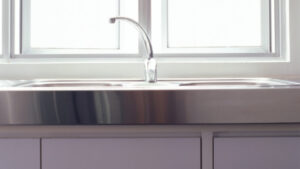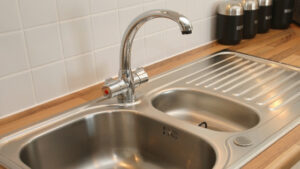 If you don’t plan the kitchen storage correctly, you will be irritated daily as you use this important part of your home. The process of organizing this storage starts with assessing what you own. The next step in the process entails preparing storage space for those kitchen belongings following the three sections or workspaces within the kitchen. This article discusses the different items which you can store within the three work zones in your kitchen.
If you don’t plan the kitchen storage correctly, you will be irritated daily as you use this important part of your home. The process of organizing this storage starts with assessing what you own. The next step in the process entails preparing storage space for those kitchen belongings following the three sections or workspaces within the kitchen. This article discusses the different items which you can store within the three work zones in your kitchen.
Work Area #1: The Refrigerator
This work zone marks the area where two primary activities take place. First, any groceries or food items you buy reach this area before they are stored or prepared. Secondly, the first preparatory steps as you cook often take place within this work zone.
The first thing you should do, therefore involves positioning the fridge close to the entrance into the kitchen. This will save you from having to walk across the entire kitchen with heavy groceries to access the refrigerator at the end of the room.
One of the features of the refrigerator work area is a countertop. This provides space where you can place groceries before you sort the items by the type of storage that they need. For example, you can pick the items which require refrigeration and place them in the fridge while the dry goods can go into a storage cabinet.
Plan to store your staples within the refrigerator work area. The items or tools you use for this initial preparation, such as mixers, graters, salad molds, and measuring cups should be stored in the cabinets within the fridge work zone.
The appliances used to prepare dry goods, such as the coffee maker, also go in the refrigerator work zone. Similarly, cookbooks are best stored in this zone because the initial preparation of dry goods happens here.
The exact amount of storage space that you need for this zone will depend on your needs as an individual. For example, an empty nester will need a lot more storage space than a single person who is just starting to acquire kitchenware. The important thing to remember when planning the storage space for this zone is that the area should be divided into about four categories (dry food storage/pantry, original food preparation equipment and tools, the refrigeration space and space for storing small appliances or utensils you occasionally use, such as bowls and trays).
Work Area #2: The Sink
The sink work zone sees the most traffic because it is needed by the refrigerator zone and the cooking area. It is therefore wise to place the sink zone in the middle of the refrigerator and cooking spaces so that this vital area can be accessed conveniently.
A sizeable countertop is paramount in this area, and it should be as clutter-free as possible so that it can be used easily.
Fox Valley plumbers explain that food prep and cleaning up happens in this area, so don’t skimp on space for these important activities.
Recycling and trash containers should be thoughtfully positioned in this work zone so that it is effortless to get rid of the trash generated during the food preparation process or the cleaning that happens afterward. A plumber in Appleton, WI can help you to select the best recycling and disposal equipment for this work zone.
Glassware, dishes, cleaning supplies, and the other items which you use daily during food prep and clean up should be stored within the sink work area for easy access. Cutting boards and knives should be stored within this zone, but close enough to the refrigerator zone so that any activity in the fridge zone that requires these items can be executed without the unnecessary inconvenience of walking a significant distance to get the needed item.
Drinking glasses can also be stored in this zone close to the point at which they are cleaned. Drawers or wall cabinets can work for this purpose, depending on your preference.
Keep items which are related closely to each other in this zone. For example, put coffee mugs in the drawers closest to the coffee maker.
Once again, the size of the space for the sink work area will depend on your belongings, but it should also be divided into four areas, namely, trash and recycling; dishwasher, sink and cleaning supplies; glasses, flatware and dishes; and finally cutlery, small appliances, and cutting boards.
Work Area #3: Cooktop/Range Area
As the name suggests, this zone is the area where cooking takes place. The ovens, range, or cooktop are the main features of this work area. This zone should be located closest to the dining room so that what is prepared doesn’t have to be moved over a long distance to the dining room/area.
A countertop is paramount in this area for the placement of hot items which have been removed from the oven or cooktop.
The storage space around this area should contain the different items, such as bowls and platters, which you use to transfer food to the dining room. You also need to set aside a cabinet for the cookware used frequently. Warming appliances should also be stored within this zone.
Spices, pans, and pots, as well as other cooking utensils, should be stored as close to the oven and range as possible for easy access during the process of cooking. You can store these items in drawers or upper cabinets, whichever suits you better.
Divide the storage space by the categories of items most used in this work zone. For example, one section can be for the cooking surfaces (stove, for example). Another section should be for microwaves or ovens. Next, reserve space for storing bakeware, cookware, and some small appliances. Finally, the items used when serving food also deserve their own space.
Use the number of people in your household as a guide when deciding how big each storage space should be. Once you organize the kitchen storage appropriately, it will be a joy to enter this space and prepare a meal for you and your loved ones each day. This cannot be possible when the plumbing isn’t just right, so partner with our experts at Tureks Plumbing Services for high-quality plumbing installation and maintenance for your dream kitchen remodel.









